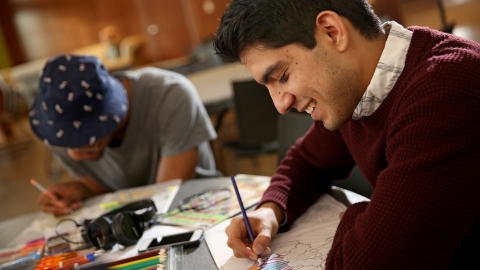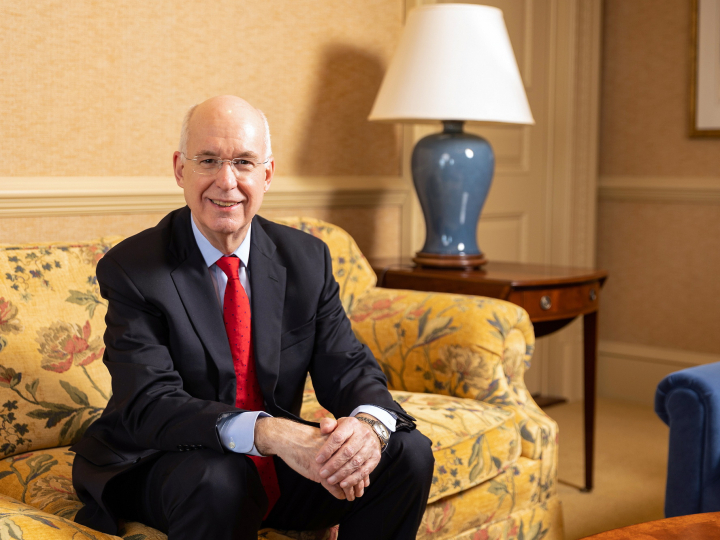
Health Services Become More Holistic
April 6, 2017
Mindful Coloring Hour conducted by Ivan Flores. Photo by Emily Paine, Communications
With a boost from supportive gifts, Bucknell is increasingly ‘mindful’ of student wellness needs
Colleges and universities have traditionally provided alcohol or drug counseling to students, but within the last decade, services that support student mental health and wellness have become increasingly in demand. In 2015, the Center for Collegiate Health reported that from 2009 to 2015, data from 139 colleges and universities showed a steady growth in the number of college students seeking counseling services on campus — and that the numbers will only continue to increase. Bucknell, however, has been especially proactive in providing services to its students.
"I consider Bucknell to be above average in what we provide, not only because we offer a variety of services, but also because of our staffing levels," says Kelly Kettlewell, a psychologist and director of the University's Counseling & Student Development Center. "We have eight full-time psychologists on staff, which is a ratio of about one for every 450 students. Nationwide, the norm is about one for every 1,500 students."
The counseling center's move in August from University Avenue to a more expansive and central campus space in the new Graham Building, adjacent to Sojka Pavillion, helped raise its profile.
The move highlighted the central importance of comprehensive student health and wellness and improved mental health support. Generous gifts from alumni and parents have funded new services and enhancements to existing ones.
One recent gift is the Dawson Family Fund, which supports the counseling center's suicide prevention program Question, Persuade, Refer, a well-regarded method embraced by many college campuses. More than 500 Bucknell students and staff — including resident assistants, trainers, coaches and public safety officers — have undergone the training.
The Dawson Family Fund also supports a new alcohol-abuse assessment tool, Brief Alcohol Screening and Intervention for College Students, or BASICS. Staff psychologists review the results of a student's online screening, and each student is provided a one-month follow-up appointment.
"Young people will struggle when they get to college," says Christina Dawson P'12, explaining the reason for the gift. "We wanted to make sure that the resources are there. You can't have a college campus without them."
Other Bucknellians have recognized how critical it is for college students to have access to treatment for addiction. Cathy and Ted Gronlund '60 recently designated an estate gift to support the counseling center's addiction services.
The Gronlunds are well aware that substance abuse is prevalent on college campuses. "We have experienced within our families the genetically predisposed link to addictions that many young people are not aware of yet," Ted Gronlund says. "Over the years we have seen how addiction can be misunderstood and the destruction it can bring to young lives. We wanted to have somewhere for the students to turn to if they needed help." The Theodore Gronlund Family Fund will fund substance-abuse prevention, education and recovery programs.
Assessments and online services benefit students, but so do meditation and other mindfulness activities that reduce stress and anxiety. A recent gift from an alumna and her husband enables the counseling center to offer Koru Mindfulness, a method that takes age-old practices, such as breathing exercises, visualization and guided meditation, and applies them to college-specific situations, such as the stress of final exams or applying for an internship.
A Mindfulness Menu presents options that align with the Koru philosophy, from interaction with therapy dogs to guided meditation to yoga for mental health to mindful coloring. Ivan Flores '16, M'18, a graduate assistant at the counseling center, leads the coloring hour. Coloring offers a chance to unwind and concentrate on something other than schoolwork or other responsibilities, says Flores, who is pursuing a master's in education.
"People come in thinking about their day, but just sitting there coloring takes their minds off some of their worries for an hour," he says. Flores can actually see students' shoulders relax as they become less stressed and more comfortable while coloring, he says.
The recent health and wellness gifts are already making an impact throughout campus. Dean of Students Amy Badal says she has spoken with students who have been "very appreciative" of the increases in programs and support from the counseling center, specifically group offerings that deviate from more traditional one-on-one counseling.
"Offerings like the yoga for mental health classes and the therapy dogs have been very well attended, and I think they're absolutely helping to destigmatize mental health," she says. "The more programs and services we provide to reduce that stigma, the better. It helps students realize that they are not alone."
The gifts also help to reinforce what Badal believes is a core principle of Bucknell: that the University offers a holistic approach to education, not only through the curriculum but through student support systems as well.
"It's the idea of mind, body and spirit," she says. "At Bucknell, we focus on the whole student."

